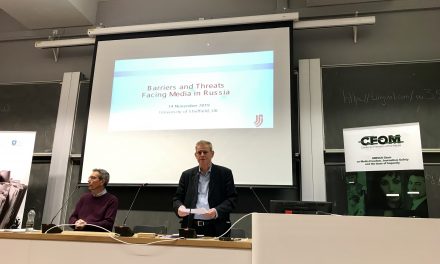 The current ‘fake news’ crisis has brought to the forefront of debate questions regarding the manipulation of information and the role of deception as a political strategy. One strand of this debate has focused on the use of propaganda and deception by authoritarian and autocratic states outside the West. In particular, there has been substantial attention to the propaganda activities of Russia. Another strand of this debate, receiving far less attention amongst the mainstream, has emphasized the role of deception, manipulation and propaganda within liberal democratic states. Indeed, whilst it is easy, and arguably unsurprising, to find that deception, manipulation and propaganda occur in states with either weak or non-existent democracy, the fact that such activities can also occur closer to home is, for many, more surprising and, indeed, troubling. As an attempt by powerful actors to manipulate and control media, propaganda is a major threat to press freedom.
The current ‘fake news’ crisis has brought to the forefront of debate questions regarding the manipulation of information and the role of deception as a political strategy. One strand of this debate has focused on the use of propaganda and deception by authoritarian and autocratic states outside the West. In particular, there has been substantial attention to the propaganda activities of Russia. Another strand of this debate, receiving far less attention amongst the mainstream, has emphasized the role of deception, manipulation and propaganda within liberal democratic states. Indeed, whilst it is easy, and arguably unsurprising, to find that deception, manipulation and propaganda occur in states with either weak or non-existent democracy, the fact that such activities can also occur closer to home is, for many, more surprising and, indeed, troubling. As an attempt by powerful actors to manipulate and control media, propaganda is a major threat to press freedom.
In fact, the use of propaganda in the West has a long history. Of course, we no longer use the term propaganda, and instead apply a range of euphemisms which, as the late leading British historian Philip Taylor pointed out ‘deflect attention away from the realities of’ propaganda’: he noted that ‘ … despite the euphemism game, democracies have grown ever more sophisticated at conducting propaganda, however labeled, which only they deny to be propaganda in the first place.’[1] Initially the rebranding exercise came with the invention of the term ‘public relations’ which, as Edward Bernays candidly explained, was invented in order to distance persuasion activities from propaganda: ‘propaganda got to be a bad word because of the Germans … using it [in 1914-18]. So what I did was to … find some other words. So we found the words Counsel on Public Relations’.[2] Today, in the realm of politics, terms such as ‘strategic communication’, ‘perception management’, ‘public diplomacy’ and ‘psychological operations’ are the preferred lexicon of professional communicators although, as revealed in the recent Chilcot Inquiry Report, political leaders such as Tony Blair are content to use the term ‘propaganda’ in private.
How does propaganda function in practice?
For many the term is most often associated with the notion of lies which involve the telling of outright falsehoods. Certainly the ‘fake news’ debate focuses on the idea of fabricated news, things which are completely untrue. However, as goes the German proverb, ‘Lies have short legs’ and more effective and commonplace forms of deception and manipulation involve selective omissions, distortions and misdirection. The most recent and well-documented example of this kind of deception in the West came with the now notorious use of intelligence during the run up to the 2003 invasion of Iraq. In both the US and the UK, intelligence agencies interacting with government officials censored inconvenient facts and whilst cherry picking the most dramatic intelligence, however flimsy. For example, Sir John Scarlett (Chair of the Joint Intelligence Committee) recommended that the British government’s Iraq dossier focus only on Iraq whilst excluding other WMD countries of concern (North Korea, Iran and Libya) in order to ‘obscure the fact’ that Iraq was unexceptional in WMD terms[3]: Sir Richard Dearlove (head of MI6) was criticized by the recent Chilcot report for his role in allowing a piece of unassessed intelligence, provided by a source on trial who was claiming to know from a sub-source that Iraq was actively producing chemical agents, to underpin the leading claim in the dossier that there was current production of chemical and biological weapons material. The source for this intelligence triggered questions almost immediately because some of the claims, regarding glass containers for chemical/biological weapons, seemed to have been inspired by a Hollywood movie ‘The Rock’, starring Sean Connery and Nicholas Cage! Of course, the intelligence services were not wholly to blame, they were, broadly speaking, following the lead of the policy makers. As Chilcot explained, Tony Blair’s ‘tactic’ regarding Iraq, from 2001 onwards, was to ‘emphasise the threat which Iraq might pose, rather than a more balanced consideration of both Iraq’s capabilities and intent.’ Put bluntly, the intelligence services were performing the role of propagandists in order to underpin government objectives.
It is also important to note that propaganda involves more than the careful crafting of manipulative and/or deceptive messages, it is also a matter of action and resource organization.
For example, in relation to the current Syrian conflict, US Secretary of State Hilary Clinton in 2012 authorised the ‘training for more than a thousand (Syrian) activists, students, and independent journalists’[4] in order to promote her regime change preference. More prominently, the much-lauded White Helmets Syria Civil Defence entity has been critiqued for its function as a pro-intervention propaganda tool. This group, apparently set up to rescue injured civilians in Syria, and which has been an important source for Western mainstream media outlets, is funded by Western organizations and associated only with opposition groups and opposition-held areas. The potential end result of these kinds of strategies can be a highly distorted representation of events. Indeed, and with regard to Syria, former British Ambassador to Syria Peter Ford and mainstream commentator Peter Hitchens have both recently stated that Western publics are being profoundly misled with regard to the reality of the situation such that Western involvement in a regime-change operation, which includes the supporting and arming of extremist groups, has been obscured via a propaganda campaign aimed at demonising Assad’s autocratic regime and promoting an overly simplistic narrative of good vs. evil.
How big a problem is propaganda in the West?
It is perhaps appropriate to take a moment to reflect upon the last 15 years of the ‘war on terror’. Presented and sold throughout as a defensive war against Islamic fundamentalist terrorism, the conflict has born witness to multiple conflicts including the invasions of Afghanistan and Iraq, military support for the overthrow of Gadaffi’s regime in Libya, and support for the attempted overthrow of Assad in Syria. A drone war, across a much wider range of countries, including Yemen and Pakistan, has also been a key feature of the ‘war on terror’. The death and destruction emanating from this conflict is immense. One estimate, focusing only on Afghanistan, Iraq and Pakistan and limited to events up to 2011, estimates the death toll of the ‘war on terror’ at 1.3 million. In part a consequence of the conflagration in the Middle East, Europe now faces its greatest refugee crisis since WWII. Recently, the Chilcot report published revealing material with regard to the genesis of this conflict. This material include a British embassy cable from September 20th 2001, right after 9/11, which described how “regime-change hawks” in Washington are arguing that a coalition put together for one purpose [against international terrorism] could be used to clear up other problems in the region’.[5] Within weeks of this cable Blair and Bush were discussing phases 1 and 2 of the ‘war on terror’ which included debate over hitting Iraq, Syria and Iran: Blair cautioned ‘If toppling Saddam is a prime objective, it is far easier to do it with Syria and Iran in favour or acquiescing rather than hitting all three at once’.[6] Blair also noted the need for a ‘dedicated, tightly knit propaganda unit for the war generally and for the Arab and Moslem world in particular.’[7] More fully, in a letter from David Manning (special advisor to Blair) to Condoleeza Rice (US Secretary of State), in a section headed ‘Propaganda’, the basic propaganda strategy was outlined with a daily ‘message according to the grid pushed out world-wide. Specific rebuttal capability set up’ and a set of initiatives designed to show how ‘from September 11, good can come for the world, led by the US’.[1] Remarkably, the evidence released by Chilcot corroborates claims made by retired General Wesley Clark (former Supreme Allied Commander Europe of NATO [1997-2000]) in 2006 that, shortly after 9/11, he was shown a memo which described how the US intended to take out ‘seven countries in five years, starting with Iraq and then Syria, Lebanon, Libya, Somalia, Sudan, and finishing off Iran’.[8]
In short, the ugly reality that now appears to be emerging, even within official documents such as the Chilcot Report, is of a ‘war on terror’, sold by a deceptive propaganda campaign about doing good for the world and/or fighting Islamic fundamentalist terrorism, being used to pursue geopolitical goals and with millions dying in the process.[9] And this would appear to have come to pass with almost no substantial recognition from mainstream western media and the liberal political establishment. This failure, from any objective or detached viewpoint, should be considered both extraordinary and scandalous in any democracy. The likely explanation for this failure, perhaps, is the stunning success of the kind of propaganda campaign mentioned by Blair? Propaganda, then, would indeed appear to be a substantial problem in the West and, accordingly, a matter for urgent inquiry by academics, journalists and publics. It is often easy to dismiss propaganda as something that happens elsewhere, or from another era. It is, however, closer to home than we like to think.
Professor Piers Robinson is Chair in Politics, Society and Political Journalism at the Department of Journalism, Faculty of Social Sciences, University of Sheffield
Sources:
[1] Taylor, P.M. (2002), ‘Perception Management and the ‘War’ Against Terrorism’, Journal of Information Warfare, 1(3): 16-29.
[2] Bernays interview, ‘Happiness Machines’, The Century of the Self, Part 1, BBC2, 29 April 2002.
[3] Herring, Eric and Robinson, Piers (2014) ‘Report X Marks the Spot: the British Government’s Deceptive Dossier on Iraq and WMD’, Political Science Quarterly, 129(4): 551-583: p. 562.
[4]Hilary Clinton (2014) Tough Choices (Simon and Schuster): p. 393.
[5] Chilcot Report Section 3.1: paragraph 65; p. 324.
[6] Memo Bush to Blair (4 December 2001), ‘The War Against Terrorism: The Second Phase’, http://www.iraqinquiry.org.uk/media/243731/2001-12-04-note-blair-to-bush-the-war-against-terrorism-the-second-phase.pdf. Accessed 15 December 2016.
[7] Ibid..
[8] Clark, Wesley (2007). ‘Objective: take out 7 countries in 5 years: Iraq, Syria, Lebanon, Libya, Somalia, Sudan, Iran,’ Democracy Now! interview, https://www.youtube.com/watch?v=bSL3JqorkdU or http://www.democracynow.org/2007/3/2/gen_wesley_clark_weighs_presidential_bid. Accessed 15 December 2016. See also: Clark, Wesley (3 October 2007), ‘Wesley Clark: A Time to Lead’, [campaign speech], Commonwealth Club of California, http://library.fora.tv/2007/10/03/Wesley_Clark_A_Time_to_Lead. Accessed 15 December 2016.
[9] See Piers Robinson (forthcoming 2017) ‘Learning from the Chilcot Report: Propaganda, Deception and the ‘War on Terror’, International Journal of Contemporary Iraqi Studies.



